外研版必修3 Module 2 Developing and Developed CountriesVocabulary and Listening,Vocabulary and speaking课件
文档属性
| 名称 | 外研版必修3 Module 2 Developing and Developed CountriesVocabulary and Listening,Vocabulary and speaking课件 | 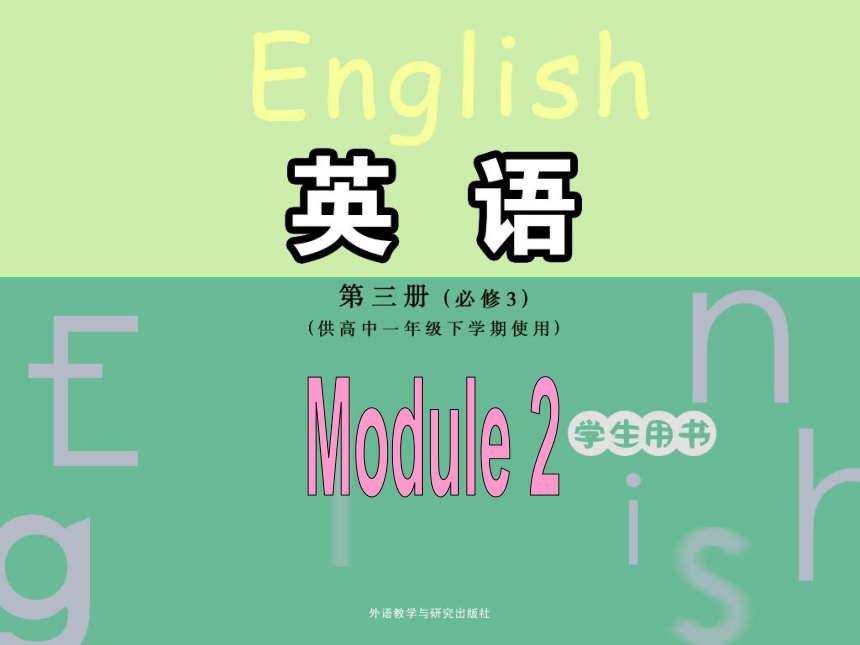 | |
| 格式 | zip | ||
| 文件大小 | 4.2MB | ||
| 资源类型 | 教案 | ||
| 版本资源 | 外研版 | ||
| 科目 | 英语 | ||
| 更新时间 | 2022-01-28 12:57:49 | ||
图片预览

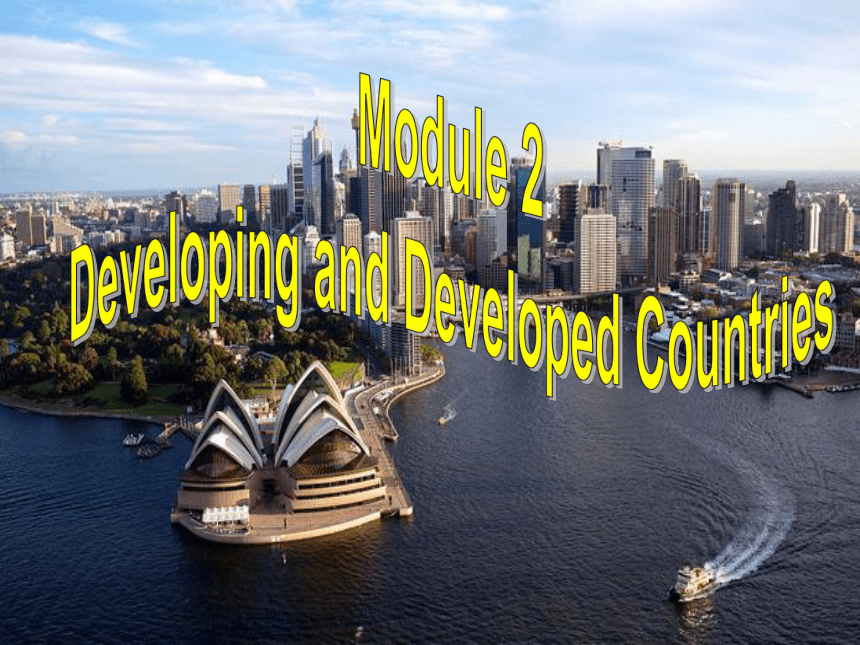

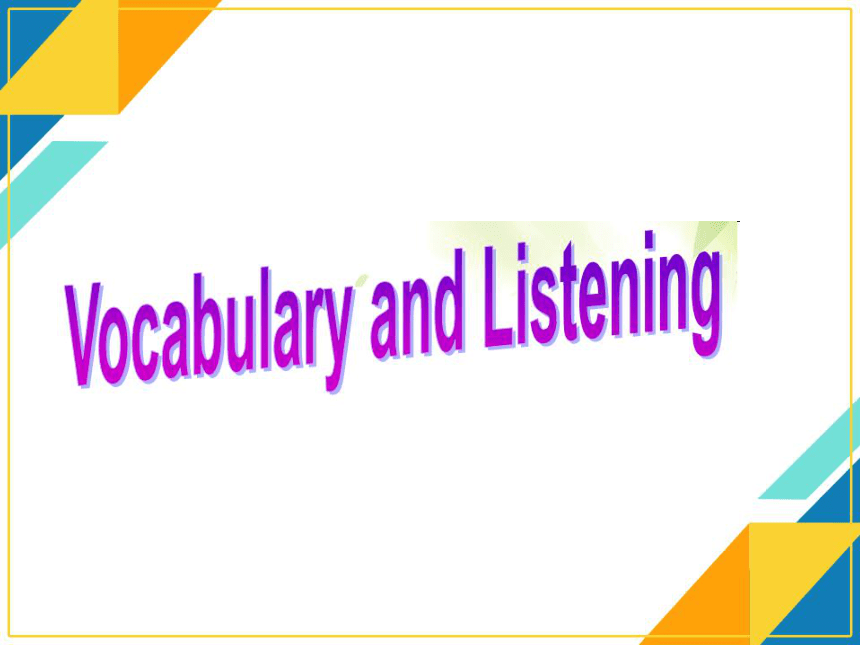

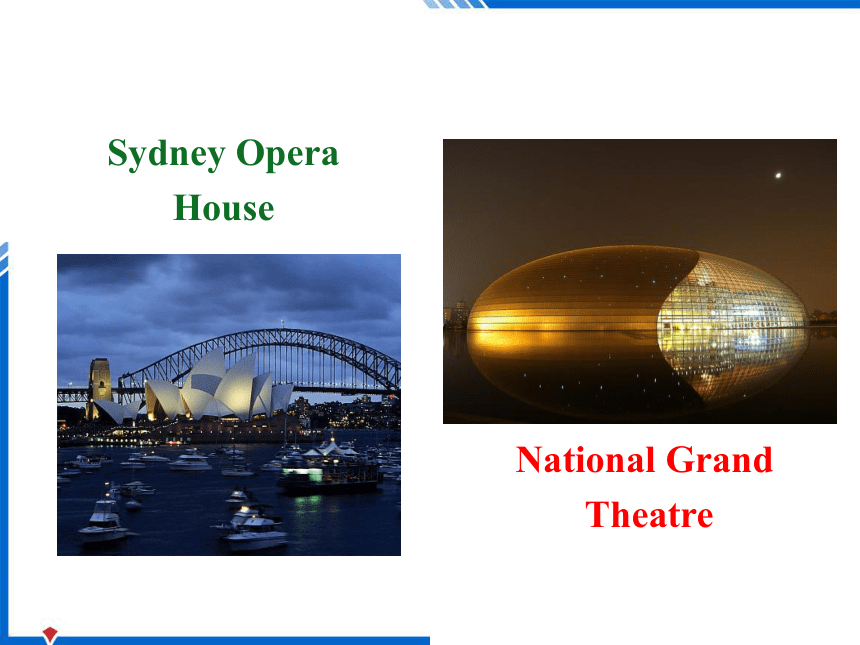
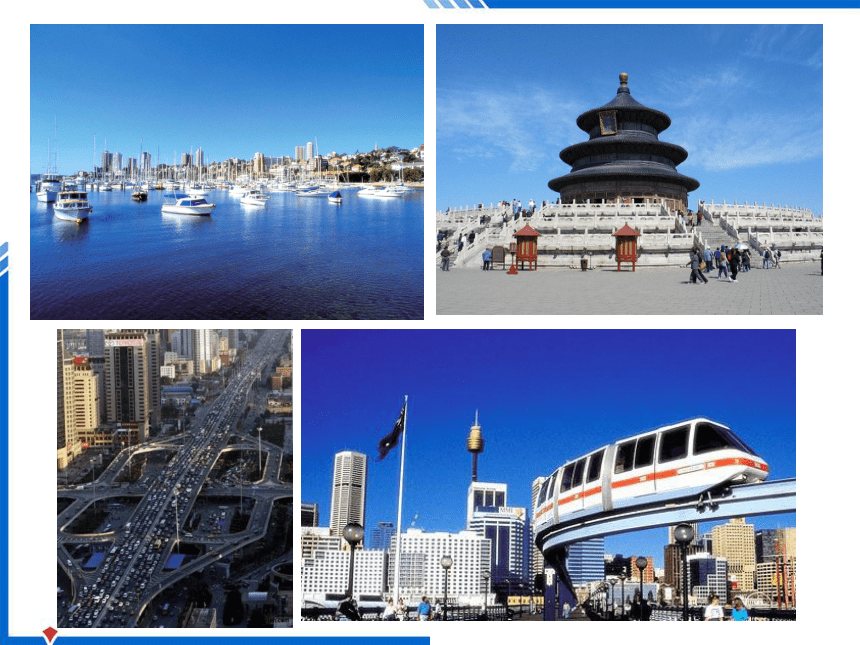
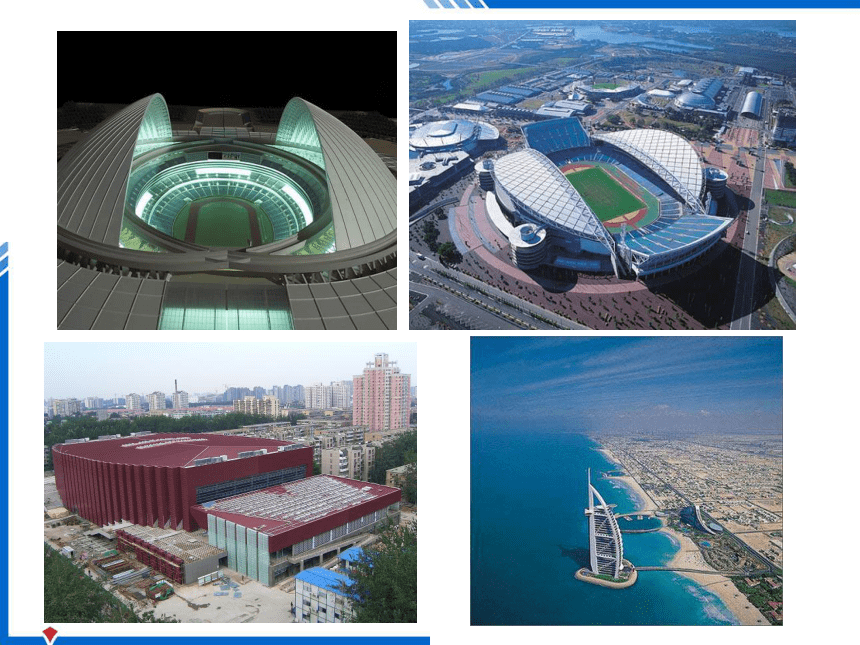
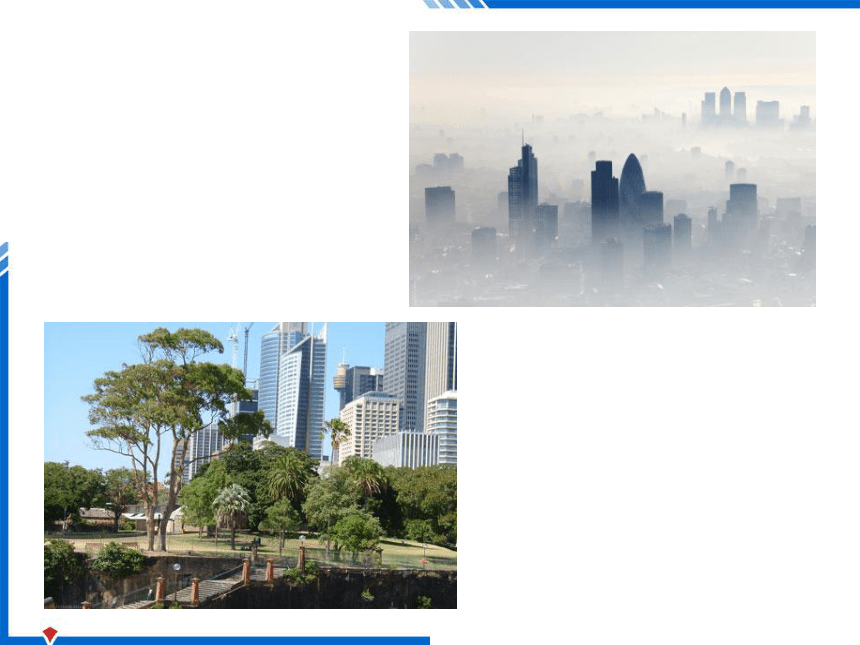
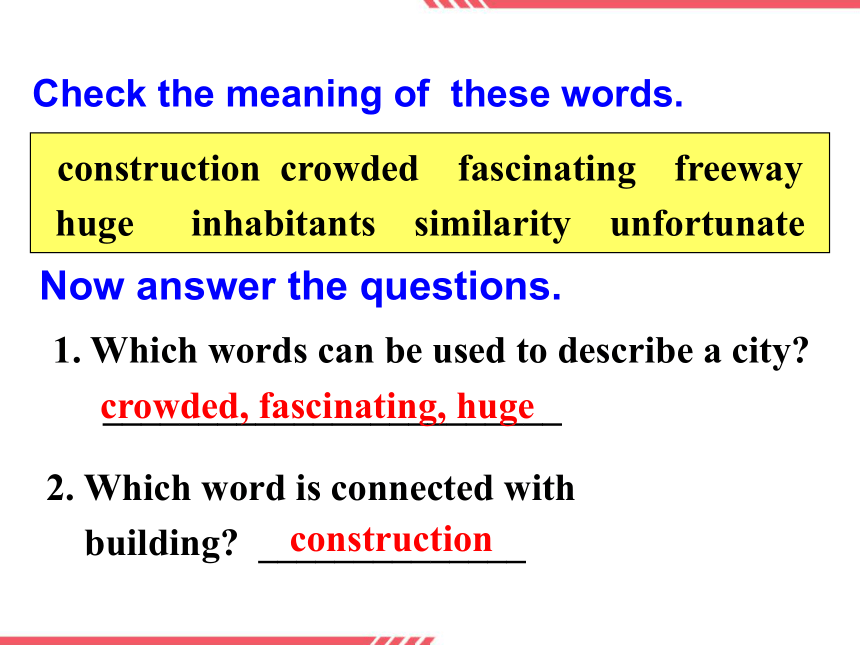
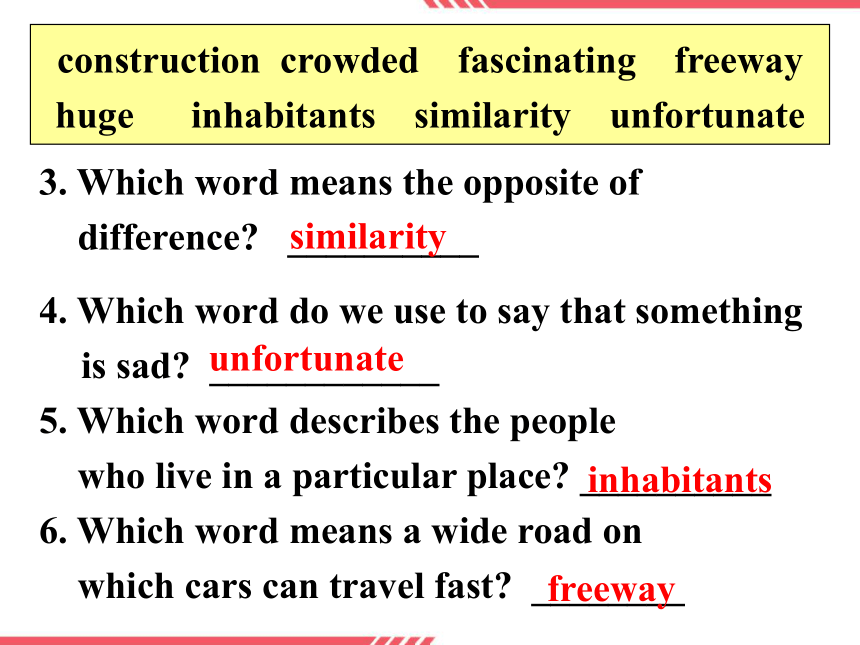

文档简介
(共46张PPT)
Module 2
Module 2
Developing and Developed Countries
1. To know about the function of making comparisons
2. Learn and master the use of comparisons and have the ability to express some topic using what they have learned
3. To learn how to express their ideas and make notes about two cities
○
○
Beijing
Sydney
What do you know about Beijing and Sydney
Sydney Opera House
National Grand
Theatre
Check the meaning of these words.
construction crowded fascinating freeway
huge inhabitants similarity unfortunate
2. Which word is connected with
building ______________
Now answer the questions.
1. Which words can be used to describe a city ________________________
crowded, fascinating, huge
construction
3. Which word means the opposite of
difference __________
similarity
construction crowded fascinating freeway
huge inhabitants similarity unfortunate
4. Which word do we use to say that something is sad ____________
5. Which word describes the people
who live in a particular place __________
6. Which word means a wide road on
which cars can travel fast ________
unfortunate
inhabitants
freeway
1. Beijing has a lot more inhabitants than Sydney and is much more crowded.
2. Beijing doesn’t have as many freeways as Sydney does.
3. There are fewer tourists in Sydney
than in Beijing.
Work in pairs. Tick the statements you think are true.
4. Beijing is less dangerous than Sydney.
5. Beijing has less rain than Sydney.
6. Beijing doesn’t have as much pollution as Sydney.
7. There are as many rich people in
Beijing as in Sydney.
8. Beijing is as lively as Sydney.
Listen to the conversation and circle the topics you hear.
climate industry location
pollution population safety
tourism transport wealth
Now listen to the conversation to check your answers.
1, 2, 4, 7, 8
Listen to the conversation and complete the blanks.
L: Is this your __________ time in Beijing, Richard
R: Yes, it is.
L: __________ do you find it
R: It’s __________ fascinating. It’s so different
from Sydney, __________ I live.
L: Now I’m fascinated. Tell me about the
__________, as you see them.
first
How
totally
where
differences
R: Well, Sydney’s a __________ city than Beijing. Beijing has a lot more inhabitants and is much more __________.
younger
crowded
L: Yes, we certainly have a __________ population, like most Chinese cities.
R: It’s very __________, as a result. And there’s so much construction __________.
huge
exciting
going on
L: I know, we’re growing very fast. For example, I don’t think we have as many __________ as Sydney does, but we soon will.
freeways
R: I believe you! I think there are fewer ________ in Beijing – at least for now. And I get the feeling that Beijing’s less __________.
L: Yes, there’s probably a lot less __________ here.
tourists
dangerous
crime
R: What about the __________ I think Sydney has less rain.
L: Yes, we can get a lot of rain _________________.
R: I’ve noticed! It’s __________ at the moment!
climate
in July and August
pouring
L: The good thing about the rain, of course, is that it washes the __________ away.
pollution
R: I’ve noticed that too. We don’t have as much pollution as you do.
L: That’s because you have less __________. The air can get quite polluted here … Ok, so that covers a lot of the differences. But are there any ____________
industry
similarities
R: Oh yes … for example, I notice the _______ and the energy.
L: Sorry, I didn’t get that.
R: The wealth and energy. I think there are as
many rich people here as in Sydney … and I think your city is just as __________ as mine.
L: That’s good to hear. So shall we go out this
evening and find some of the __________
wealth
lively
action
1. How do you find it means _____
A. What is your opinion
B. How did you get here
2. It’s totally fascinating means _______
A. It’s very, very interesting
B. It’s very, very important
Choose the correct answer.
3. as you see means______
A. while you see them
B. in your opinion
4. I didn’t get that means_____
A. I didn’t take that
B. I didn’t hear what you said
5. find some of the action means____
A. let’s do something interesting
B. let’s act
1. How do you find it means _____.
A. What is your opinion about it
B. How did you get here
2. It’s totally fascinating means ______.
A. It’s very, very interesting
B. It’s very, very important
Choose the correct answer.
A
A
3. as you see means ______.
A. while you see them
B. in your opinion
4. I didn’t get that means _____.
A. I didn’t take that
B. I didn’t hear what you said
5. find some of the action means ____.
A. Let’s do something interesting
B. Let’s act
B
B
A
A: I visited Great Wall yesterday.
B: Really __________________
A: ___________________ I enjoyed it very much.
B: Can you describe it, ___________
Fill in the blanks.
How do you find it
It’s totally fascinating.
as you see it
A: Well, I can’t imagine how can they build it hundreds of years ago
B: Sorry, _____________.
A: I mean it is incredible. The Great Wall can be built hundreds of years ago.
B: Yes, it’s really great.
I don’t get it
Look at these sentences from Vocabulary and listening activity 2. Answer the questions.
a … Beijing has a lot more inhabitants
( than Sydney) and is much more
crowded.
b … I don’t think we have as many
freeways as Sydney does.
c … there are fewer tourists in Beijing
(than in Sydney).
d … (Beijing) is less dangerous (than
Sydney).
e … I think Sydney has less rain (than
Beijing).
f … (Sydney doesn’t ) have as much
pollution as (Beijing).
much many fewer less
1 Which words do we use with countable nouns
2 Which words do we use with uncountable nouns
much
many
fewer
less
countable
nouns
uncountable
nouns
1. Is Hong Kong less / fewer crowed than Beijing
2. Beijing doesn’t have as many /much high-rise building as Hong Kong.
3. Beijing has a lot / much more inhabitants than Hong Kong.
Choose the correct word.
4. Hong Kong has less / fewer industry than Beijing.
5. Beijing doesn’t have as much / many tourism as Hong Kong.
Use the words to fill the blank.
1. There are _______ poor countries in Europe than in Africa.
2. There are not as ______ rich countries in Africa as in Europe.
3. There is not as _______ transportation in my hometown as in Shanghai.
fewer
many
much
4. There is ____ transportation in my
hometown than in Shanghai.
5. I don’t think there are as ______ students
in this university as in that one.
less
many
VOCABULARY AND SPEAKING
Check the meaning of these words Which ones describe positive features of a city
attractive busy dangerous dirty industrial lively modern noisy peaceful polluted poor smart vast wealthy
positive features: attractive, lively, modern,
peaceful, smart, wealthy
Which words in activity 1 can you use to describe these places
New York Hong Kong Beijing Lhasa your town
Compare two towns or cities you know. Talk about these aspects of the towns
or cities.
tourism population industry
climate location transport
根据下面各句句意以及所给单词的首字母或汉语提示词,写出该单词的正确形式(每空一词)。
1. Can you read this f________ Is it a three or an eight
2. The show raised thousands of dollars for ________ (慈善团体).
3. Horses were the only means of t________ in the past.
figure
charity
transport
4. The f________ has a 50 mph speed limit.
Slow down — you’re breaking it.
5. The boy looks very ________ (时髦的) in
his new suit, doesn’t he
6. The people who have taken our advice
have saved themselves v________
amounts of money.
7. Is five apples for five eggs a fair
e________
freeway
smart
vast
exchange
II. 用括号内单词的正确形式填空。
1. Three hundred people were made ________
(home) by the earthquake.
2. The train was very ________ (crowd), and
we had to stand.
3. There are some ________ (similar) between
the two plays.
4. It’s _________ (fortunate) that so few people
would help.
homeless
crowded
similarities
unfortunate
5. We have not found a good ________
(locate) for the new offices.
6. These beautiful old towns have remained
untouched by ________ (tour).
7. A recent study has found that Canada is
last among the group of leading ________
(industry) nations.
location
tourism
industrial
8. Who’s going to clean up the ________
(pollute) river
9. He fell in the water, much to the
____________ (entertain) of the children.
polluted
entertainment
Finish the exercises 12-14 on page 76.
Module 2
Module 2
Developing and Developed Countries
1. To know about the function of making comparisons
2. Learn and master the use of comparisons and have the ability to express some topic using what they have learned
3. To learn how to express their ideas and make notes about two cities
○
○
Beijing
Sydney
What do you know about Beijing and Sydney
Sydney Opera House
National Grand
Theatre
Check the meaning of these words.
construction crowded fascinating freeway
huge inhabitants similarity unfortunate
2. Which word is connected with
building ______________
Now answer the questions.
1. Which words can be used to describe a city ________________________
crowded, fascinating, huge
construction
3. Which word means the opposite of
difference __________
similarity
construction crowded fascinating freeway
huge inhabitants similarity unfortunate
4. Which word do we use to say that something is sad ____________
5. Which word describes the people
who live in a particular place __________
6. Which word means a wide road on
which cars can travel fast ________
unfortunate
inhabitants
freeway
1. Beijing has a lot more inhabitants than Sydney and is much more crowded.
2. Beijing doesn’t have as many freeways as Sydney does.
3. There are fewer tourists in Sydney
than in Beijing.
Work in pairs. Tick the statements you think are true.
4. Beijing is less dangerous than Sydney.
5. Beijing has less rain than Sydney.
6. Beijing doesn’t have as much pollution as Sydney.
7. There are as many rich people in
Beijing as in Sydney.
8. Beijing is as lively as Sydney.
Listen to the conversation and circle the topics you hear.
climate industry location
pollution population safety
tourism transport wealth
Now listen to the conversation to check your answers.
1, 2, 4, 7, 8
Listen to the conversation and complete the blanks.
L: Is this your __________ time in Beijing, Richard
R: Yes, it is.
L: __________ do you find it
R: It’s __________ fascinating. It’s so different
from Sydney, __________ I live.
L: Now I’m fascinated. Tell me about the
__________, as you see them.
first
How
totally
where
differences
R: Well, Sydney’s a __________ city than Beijing. Beijing has a lot more inhabitants and is much more __________.
younger
crowded
L: Yes, we certainly have a __________ population, like most Chinese cities.
R: It’s very __________, as a result. And there’s so much construction __________.
huge
exciting
going on
L: I know, we’re growing very fast. For example, I don’t think we have as many __________ as Sydney does, but we soon will.
freeways
R: I believe you! I think there are fewer ________ in Beijing – at least for now. And I get the feeling that Beijing’s less __________.
L: Yes, there’s probably a lot less __________ here.
tourists
dangerous
crime
R: What about the __________ I think Sydney has less rain.
L: Yes, we can get a lot of rain _________________.
R: I’ve noticed! It’s __________ at the moment!
climate
in July and August
pouring
L: The good thing about the rain, of course, is that it washes the __________ away.
pollution
R: I’ve noticed that too. We don’t have as much pollution as you do.
L: That’s because you have less __________. The air can get quite polluted here … Ok, so that covers a lot of the differences. But are there any ____________
industry
similarities
R: Oh yes … for example, I notice the _______ and the energy.
L: Sorry, I didn’t get that.
R: The wealth and energy. I think there are as
many rich people here as in Sydney … and I think your city is just as __________ as mine.
L: That’s good to hear. So shall we go out this
evening and find some of the __________
wealth
lively
action
1. How do you find it means _____
A. What is your opinion
B. How did you get here
2. It’s totally fascinating means _______
A. It’s very, very interesting
B. It’s very, very important
Choose the correct answer.
3. as you see means______
A. while you see them
B. in your opinion
4. I didn’t get that means_____
A. I didn’t take that
B. I didn’t hear what you said
5. find some of the action means____
A. let’s do something interesting
B. let’s act
1. How do you find it means _____.
A. What is your opinion about it
B. How did you get here
2. It’s totally fascinating means ______.
A. It’s very, very interesting
B. It’s very, very important
Choose the correct answer.
A
A
3. as you see means ______.
A. while you see them
B. in your opinion
4. I didn’t get that means _____.
A. I didn’t take that
B. I didn’t hear what you said
5. find some of the action means ____.
A. Let’s do something interesting
B. Let’s act
B
B
A
A: I visited Great Wall yesterday.
B: Really __________________
A: ___________________ I enjoyed it very much.
B: Can you describe it, ___________
Fill in the blanks.
How do you find it
It’s totally fascinating.
as you see it
A: Well, I can’t imagine how can they build it hundreds of years ago
B: Sorry, _____________.
A: I mean it is incredible. The Great Wall can be built hundreds of years ago.
B: Yes, it’s really great.
I don’t get it
Look at these sentences from Vocabulary and listening activity 2. Answer the questions.
a … Beijing has a lot more inhabitants
( than Sydney) and is much more
crowded.
b … I don’t think we have as many
freeways as Sydney does.
c … there are fewer tourists in Beijing
(than in Sydney).
d … (Beijing) is less dangerous (than
Sydney).
e … I think Sydney has less rain (than
Beijing).
f … (Sydney doesn’t ) have as much
pollution as (Beijing).
much many fewer less
1 Which words do we use with countable nouns
2 Which words do we use with uncountable nouns
much
many
fewer
less
countable
nouns
uncountable
nouns
1. Is Hong Kong less / fewer crowed than Beijing
2. Beijing doesn’t have as many /much high-rise building as Hong Kong.
3. Beijing has a lot / much more inhabitants than Hong Kong.
Choose the correct word.
4. Hong Kong has less / fewer industry than Beijing.
5. Beijing doesn’t have as much / many tourism as Hong Kong.
Use the words to fill the blank.
1. There are _______ poor countries in Europe than in Africa.
2. There are not as ______ rich countries in Africa as in Europe.
3. There is not as _______ transportation in my hometown as in Shanghai.
fewer
many
much
4. There is ____ transportation in my
hometown than in Shanghai.
5. I don’t think there are as ______ students
in this university as in that one.
less
many
VOCABULARY AND SPEAKING
Check the meaning of these words Which ones describe positive features of a city
attractive busy dangerous dirty industrial lively modern noisy peaceful polluted poor smart vast wealthy
positive features: attractive, lively, modern,
peaceful, smart, wealthy
Which words in activity 1 can you use to describe these places
New York Hong Kong Beijing Lhasa your town
Compare two towns or cities you know. Talk about these aspects of the towns
or cities.
tourism population industry
climate location transport
根据下面各句句意以及所给单词的首字母或汉语提示词,写出该单词的正确形式(每空一词)。
1. Can you read this f________ Is it a three or an eight
2. The show raised thousands of dollars for ________ (慈善团体).
3. Horses were the only means of t________ in the past.
figure
charity
transport
4. The f________ has a 50 mph speed limit.
Slow down — you’re breaking it.
5. The boy looks very ________ (时髦的) in
his new suit, doesn’t he
6. The people who have taken our advice
have saved themselves v________
amounts of money.
7. Is five apples for five eggs a fair
e________
freeway
smart
vast
exchange
II. 用括号内单词的正确形式填空。
1. Three hundred people were made ________
(home) by the earthquake.
2. The train was very ________ (crowd), and
we had to stand.
3. There are some ________ (similar) between
the two plays.
4. It’s _________ (fortunate) that so few people
would help.
homeless
crowded
similarities
unfortunate
5. We have not found a good ________
(locate) for the new offices.
6. These beautiful old towns have remained
untouched by ________ (tour).
7. A recent study has found that Canada is
last among the group of leading ________
(industry) nations.
location
tourism
industrial
8. Who’s going to clean up the ________
(pollute) river
9. He fell in the water, much to the
____________ (entertain) of the children.
polluted
entertainment
Finish the exercises 12-14 on page 76.
